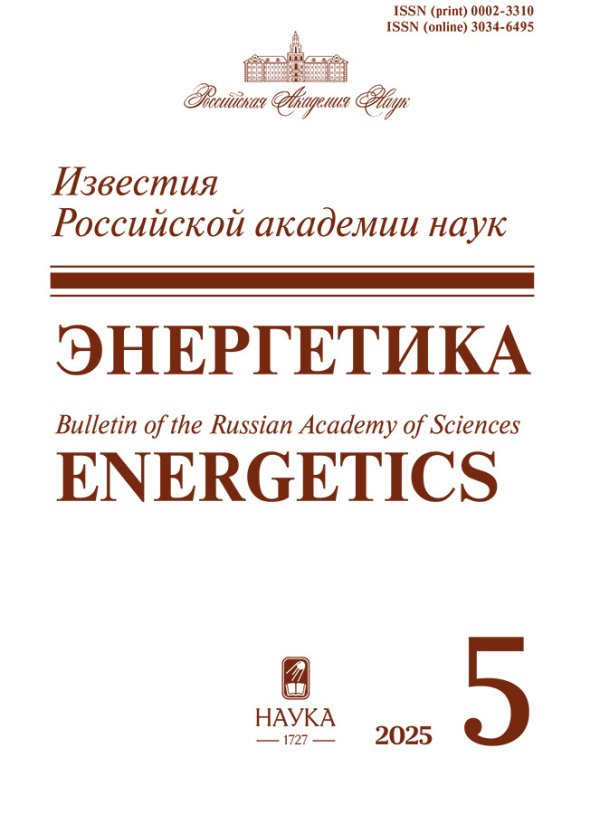Heat Efficiency in Municipalities
- Authors: Boyko Е.Е.1, Byk F.L.2, Ilyushin P.V.1, Myshkina L.S.2
-
Affiliations:
- Energy Research Institute of the Russian Academy of Sciences
- Novosibirsk State Technical University
- Issue: No 4 (2023)
- Pages: 66-78
- Section: Articles
- URL: https://rjsvd.com/0002-3310/article/view/660209
- DOI: https://doi.org/10.31857/S0002331023040040
- EDN: https://elibrary.ru/YKHQHW
- ID: 660209
Cite item
Abstract
A complex analysis of heat supply systems from the standpoint of reliability, efficiency and environmental friendliness has been carried out. It has been revealed that in heat supply systems the weakest link in terms of reliability is heat networks. The main number of accidents accompanied by interruption of thermal energy supply occurs on them. The cost and availability are the basis for the efficiency of the primary energy resources used, including: the energy efficiency of technologies, their conversion into useful types of energy, as well as the amount of losses in the transfer of thermal energy to heat receivers. Environmental friendliness is determined by the volume of harmful emissions during the production and transmission of the heat conductor. Methods for improving the indicated properties of heat supply systems are proposed, which is especially important for small, medium and large cities, where boiler houses are the basis of heat supply systems. It is shown that the inclusion of cogeneration sources in the composition of heat supply systems contributes to the growth of their energy efficiency. Peak sources of thermal energy, located in close proximity to heat sinks, can reduce heat losses and increase the reliability of heat networks. With the increase in the availability of electricity, prerequisites arise for the use of electric boilers as peak sources of thermal energy. The proposed changes should be included in the Heat Supply Schemes developed by municipal authorities, which should be supported by the expert community in order to increase the investment attractiveness of the thermal power industry.
About the authors
Е. Е. Boyko
Energy Research Institute of the Russian Academy of Sciences
Email: ilyushin.pv@mail.ru
Russia, Moscow
F. L. Byk
Novosibirsk State Technical University
Email: ilyushin.pv@mail.ru
Russia, Novosibirsk
P. V. Ilyushin
Energy Research Institute of the Russian Academy of Sciences
Author for correspondence.
Email: ilyushin.pv@mail.ru
Russia, Moscow
L. S. Myshkina
Novosibirsk State Technical University
Email: ilyushin.pv@mail.ru
Russia, Novosibirsk
References
- Федеральный закон от 23.11.2009 № 261-ФЗ (ред. от 14.07.2022) “Об энергосбережении и о повышении энергетической эффективности и о внесении изменений в отдельные законодательные акты Российской Федерации” (с изм. и доп., вступ. в силу с 01.01.2023).
- Информационно-аналитический доклад о состоянии теплоэнергетики и централизованного теплоснабжения в Российской Федерации в 2020 г. // https://minenergo.gov.ru›system/ download-pdf/22832/181259 (дата обращения: 05.03.2023).
- Дильман М.Д., Филиппов С.П. Требования к топливной эффективности перспективных когенерационных установок // Изв. РАН. Энергетика. 2017. № 5. С. 102–111.
- Бойко Е.Е., Бык Ф.Л., Мышкина Л.С. Гибкость и энергоэффективность систем энергоснабжения // Энергетик. 2022. № 9. С. 24–28.
- Бойко Е.Е., Бык Ф.Л., Илюшин П.В., Мышкина Л.С. Способы повышения эффективности территориальных систем энергоснабжения // Известия высших учебных заведений. Электромеханика. 2022. Т. 65. № 4. С. 108–117.
- Молодюк В.В. Математическая модель работы ТЭЦ на рынке электроэнергии и тепла // Энергетик. 2014. № 11. С. 12–16.
- Схема теплоснабжения Владивостокского городского округа на период до 2036 г. (актуализация на 2023 г.).
- Энергетическая стратегия Российской Федерации на период до 2035 г. // https://minenergo. gov.ru/node/1026 (дата обращения: 05.03.2023).
- Главные новости политики, экономики и бизнеса, комментарии аналитиков, финансовые данные с российских и мировых биржевых систем // https://www.rbc.ru/rbcfreenews/ 639093419a7947428cfa5a1a?from=newsfeed (дата обращения: 05.03.2023).
- Главные новости политики, экономики и бизнеса, комментарии аналитиков, финансовые данные с российских и мировых биржевых систем // https://nsk.rbc.ru/nsk/02/ 12/2022/638a04ed9a794777f3641870?from=from_main_11 (дата обращения: 05.03.2023).
- РИА Новости. События в Москве, России и мире // https://ria.ru/20230119/khabarovsk-1845868548.html (дата обращения: 05.03.2023).
- Главные новости политики, экономики и бизнеса, комментарии аналитиков, финансовые данные с российских и мировых биржевых систем // https://nsk.rbc.ru/nsk/12/12/2022/ 6396b1519a79475ad9573c89?from=from_main_5 (дата обращения: 05.03.2023).
- Главные новости политики, экономики и бизнеса, комментарии аналитиков, финансовые данные с российских и мировых биржевых систем // https://nsk.rbc.ru/nsk/02/12/2022/ 638a04ed9a794777f3641870?from=from_main_11 (дата обращения: 05.03.2023).
- Онлайн-журнал о жизни в Кузбассе // https://sibdepo.ru/news/zhiteli-i-organizatsii-kuzbassa-zadolzhali-bolee-3-mlrd-rublej-za-teplo-i-goryachuyu-vodu.html (дата обращения: 05.03.2023).
- Федеральный закон от 27.07.2010 № 190-ФЗ (ред. от 01.05.2022) “О теплоснабжении”.
Supplementary files

















